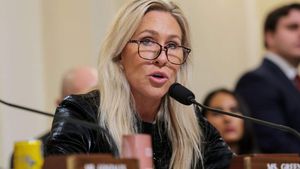CONTACTAbout UsCAREER OPPORTUNITIESADVERTISE WITH USPRIVACY POLICYPRIVACY PREFERENCESTERMS OF USELEGAL NOTICE
© 2025 Equal Entertainment LLC.
All Rights reserved
All Rights reserved
By continuing to use our site, you agree to our Privacy Policy and Terms of Use.
We need your help
Your support makes The Advocate's original LGBTQ+ reporting possible. Become a member today to help us continue this work.
Your support makes The Advocate's original LGBTQ+ reporting possible. Become a member today to help us continue this work.
20s/30s Due to higher risk of breast cancer, lesbians should have a clinical breast exam every three years and conduct regular self-exams at home.
Nonmonogamous gay and bisexual men should have a full STD screening every three months. Don't worry about the painful Q-tip in the penis. It's all pee-in-a-cup now.
Human papillomavirus (HPV) can lead to anal, rectal, lip, throat, and esophageal cancers, so get tested (men should request the anal Pap smear test). And people of all ages should get the Gardasil vaccination.
Women should start getting a vaginal Pap test within three years of becoming sexually active, or by age 21, and then every two years. This test can help find abnormalities in the cervix before cervical cancer develops. HIV-positive women should be screened more often.
40s/50s All women over 40 should have an annual mammogram. High-risk individuals -- those with family history of breast cancer -- should consider MRI screenings as well.
Men and women with a family history of colon cancer should be tested for precancerous polyps starting at age 50 -- or, alternatively, 10 years younger than the age at which a family member was diagnosed. Repeat every five years, or every three years if polyps are found. Go for the standard colonoscopy -- it's both diagnostic and therapeutic.
African-American men and men with a family history of prostate cancer should start prostate-specific antigen (PSA) blood tests at age 45; all others should start at age 50.
All ages Get the hepatitis vaccinations -- there is a series of three shots. There's no reason in this day and age that anyone should get hep A or B.
Nonmonogamous gay and bisexual men should have a full STD screening every three months. Don't worry about the painful Q-tip in the penis. It's all pee-in-a-cup now.
Human papillomavirus (HPV) can lead to anal, rectal, lip, throat, and esophageal cancers, so get tested (men should request the anal Pap smear test). And people of all ages should get the Gardasil vaccination.
Women should start getting a vaginal Pap test within three years of becoming sexually active, or by age 21, and then every two years. This test can help find abnormalities in the cervix before cervical cancer develops. HIV-positive women should be screened more often.
40s/50s All women over 40 should have an annual mammogram. High-risk individuals -- those with family history of breast cancer -- should consider MRI screenings as well.
Men and women with a family history of colon cancer should be tested for precancerous polyps starting at age 50 -- or, alternatively, 10 years younger than the age at which a family member was diagnosed. Repeat every five years, or every three years if polyps are found. Go for the standard colonoscopy -- it's both diagnostic and therapeutic.
African-American men and men with a family history of prostate cancer should start prostate-specific antigen (PSA) blood tests at age 45; all others should start at age 50.
All ages Get the hepatitis vaccinations -- there is a series of three shots. There's no reason in this day and age that anyone should get hep A or B.
From our Sponsors
Most Popular
Bizarre Epstein files reference to Trump, Putin, and oral sex with ‘Bubba’ draws scrutiny in Congress
November 14 2025 4:08 PM
True
Jeffrey Epstein’s brother says the ‘Bubba’ mentioned in Trump oral sex email is not Bill Clinton
November 16 2025 9:15 AM
True
Gay makeup artist Andry Hernández Romero describes horrific sexual & physical abuse at CECOT in El Salvador
July 24 2025 10:11 AM
True
Watch Now: Pride Today
Latest Stories
I didn’t just run the world’s major marathons. I changed them
December 17 2025 4:31 PM
Pam Bondi wants FBI to offer bounties for ‘radical gender ideology’ groups, leaked memo shows
December 17 2025 3:17 PM
Rock Hudson had a 'legendarily large penis,' Armistead Maupin says
December 17 2025 3:05 PM
California councilmember blames daughter becoming a lesbian on sexual trauma
December 17 2025 2:26 PM
California hospital will continue youth gender-affirming care after families protest
December 17 2025 11:18 AM
Tennessee whistleblower says library board chair sought private data as part of state's book purge
December 17 2025 7:00 AM
Lesbian federal worker pleads for answers about wife trapped in immigration detention limbo
December 16 2025 5:08 PM
Michigan Republican U.S. Senate candidate Mike Rogers surrounds himself with hardcore LGBTQ+ rights opponents
December 16 2025 2:53 PM
True




































































Charlie Kirk DID say stoning gay people was the 'perfect law' — and these other heinous quotes